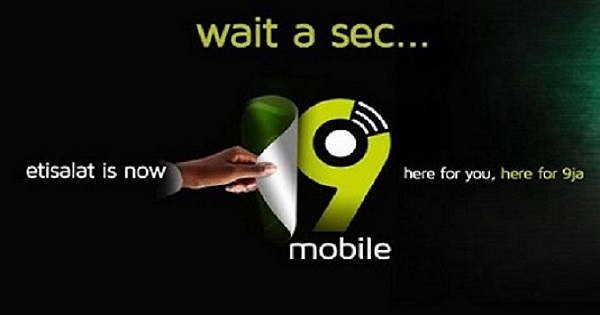Telecom
Teleology Partners Safaricom, Unveils 10-Point Agenda for 9mobile

Teleology Holdings, the preferred bidder for the deal, has reeled out its 10-point agenda for 9mobile.
This is coming some 24 hours after meeting Thursday’s deadline set by the financial adviser handling the sale of 9mobile for the payment of the $50 million non-refundable cash deposit for the Nigeria’s fourth largest telecoms operator.
According to Teleology, it plans to implement the agenda by the time it takes full ownership, after it must have completed payment of the balance of $500 million bid price for 9mobile, which it has been given another 90 days to meet.
Having partnered Safaricom, the biggest telecoms operator in East Africa to transform 9mobile, Teleology said the emerging telecoms company would be engineering-led, to enable it compete favourably with existing telecoms companies in Nigeria, that must have gained more market shares during the 9mobile financial crisis.
Teleology, in a statement detailed an ambitious plan of action that will guide its rapid overhaul not only of the network but all aspects of the operations.
According to Mr. Adrian Wood, its director “9mobile is transiting into a new phase that will be defined by optimal value delivery: value to our employees, value to our customers, value to local communities and indeed to all stakeholders.”
He added that the new organisation to emerge would be “engineering led and brand driven, ” adding that in delivering service, “we will strive to ensure that 9mobile operations deliver fulfillment to our customers, empowerment to local communities, protection to the vulnerable, and excellent rewards not only to our shareholders but to all stakeholders.”
Wood added that Teleology has set out a 10-point plan that aggregates its mission and how it intends to turn the 9mobile organisation around.
Part of the plan is to double the 9mobile network with new 3G/4G specific cell sites as well as a several thousands of kilometers of fiber optic cable across the country. It will drive a special program of rural internet coverage, focusing on 4G with broadband access planned for all of Nigeria’s 774 Local government areas.
Youth engagement and employment programs are also planned with all build contractors, distributors and consultants, he said, while investment in broadband internet access technologies which are completely new to Nigeria, are also planned. Wood said the 9mobile network would be optimised for high speed and high capacity data including imaging, video, games, music, IPTV and more.
“Any three-point plan or three-dimension idea is naïve and completely missing the scope and complexity of the urgent Nigerian need to be brought into the 21st century broadband era,” Wood said in the statement.
Teleology, he added, envisages an increase of 50 per cent in direct employment in the new 9mobile. There is also an active plan to introduce within the first year, several million 4G-capable premium quality smartphones, at exceedingly affordable pricing.
“Nigerians should look forward to a new regime of intensely exciting and innovative brand loyalty rewards programs, from the new 9mobile,” he said.
He disclosed that Teleology had entered into an alliance with Safaricom, the largest network operator in East Africa.
Safaricom is famous for its global “mpesa” mobile financial services system, which advances financial inclusion and supports the network with the highest operating efficiencies in Africa.
Coming at a period when competition in the Nigerian telecom industry has for some years been limited to price wars between the various GSM companies, clearly, Teleology’s coming will very likely herald a new era of intense competition and quest for market share among Nigeria’s telecom operators.
Teleology is promoted by a group of 12 telecom industry veterans with considerable experience not only in Nigeria and Africa but in the global telecom space as well. The executive management for instance, boasts more than 337 years of collective frontline operational management experience, Wood said.
He however expressed thanks to Barclays Africa, the financial advisers to the 9mobile transaction, the Nigerian bank syndicate, the backing and support of the Nigerian Communications Commission (NCC) and the Central Bank of Nigeria (CBN), which he said, made 9mobile’s survival possible. He also expressed his gratitude to the loyal 9mobile management and staff who carried on in the face of skepticism, doubt and negative market sentiment.
Wood assured Nigerians that additional details including formal relaunch plans would be unveiled in due course.
Telecom
NCC Orders Telcos Inform Subscribers of Data Breach within 48 Hours

Nigerian Communications Commission (NCC) has directed telecom operators in the country to notify affected customers of any data breach within 48 hours ( that is two day) of detecting such unauthorised infringement.

This directive was contained in the revised Internet Code of Practice 2026 by the NCC, on Friday.
The document seeks to define the rights and obligations of telecom operators in handing the rights of internet users to an open internet.
In the move to protect customer information, Mobile Network Operators (MNOs) and Internet Service Providers (ISPs) are to take necessary measures to protect customers’ data from unauthorised use, disclosure, access or breach.
Telecom operators must now notify affected customers within 48 hours of detecting a compromise through text message, email or any other effective means. As contained in Chapter 3.4 of the regulation titled “Data Breach Notifications,”
The telecoms companies are also directed to notify the NCC of such a breach not later than 48 hours after determining such a breach.
“Where full details of the breach are not immediately available, the provider shall issue a preliminary notification within the same period and furnish a comprehensive update within Fourteen (14) days thereafter, or within such extended period as the Commission may approve,” part of the section reads.
The guidelines, according to NCC, are in tandem with the provisions contained in the Nigerian Data Protection Act 2023 and Part VI of Schedule 1 of the Consumer Code of Practice Regulations 2024.
The regulation also joins other agencies’ policies, ensuring protection. Agencies such as the Nigeria Data Protection Commission (NDPC) and the Federal Competition and Consumer Protection Commission (FCCPC) protect consumers against misuse of personal data, identity theft, financial loss, and reputation damage.
The review comes at a time when privacy becomes core amid frequent breaches and illegal harvest of data such as biometric, national IDs, financial information, traffic and usage, and others.
Regulations are necessary for the proper handling, consent, and regulatory compliance regarding sensitive data, ensuring it is only processed for legitimate purposes.
Under Chapter 3.5, the Internet Code of Practice 2026 addressed the handling of harvesting of transactional data by notifying and getting approval from the NCC of any usage by a third party. It noted that the NCC approval will be defined by a review and assessment of such access and “its potential effects on national considerations, consumer information and personal data.”
Telecom
Globacom Promotes Valentine Gifting with Huge Discounts on Smartphones

Globacom has announced a Valentine Smartphone promotion, which provides incredible savings on a variety of high-end smartphones from top manufacturers including Tecno, Samsung, and Infinix.

Starting on February 9, the promotion provides substantial price reductions on a number of Samsung models, including the Galaxy Z Fold 7, Galaxy A07, Galaxy A56 5G, Galaxy A36 5G, and Galaxy A26 5G. Customers who buy any of the phones will also receive a complimentary travel pouch and charger, as well as up to 18GB of extra data for six months, only available on the Glo network.
Along with other Infinix models, Tecno devices are also offered at attractive discounts, giving customers a large range of smartphones to fit a variety of tastes and price ranges.
The goal of the Glo Valentine promotion is to provide customers with the best possible deals on carefully chosen smartphones that are renowned for their cutting-edge technology, stylish designs, and dependable performance. The offer, which includes alternatives to suit a range of budgets and lifestyles, reaffirms Globacom’s dedication to customer happiness, digital adoption, greater data usage, and client centricity.
The company revealed that the promotion aligned with customers’ expectations during celebratory seasons, when demand is highest for quality smartphones at affordable prices. The company added that its partnership with trusted global and regional brands such as Samsung, Infinix, and Tecno ensures that customers enjoy premium features without compromising on value.
“The Valentine season is about connection, and what better way to stay connected than with a smartphone that fits your needs and aspirations,” the company stated. “This promo gives our customers the chance to get their dream smartphones at some of the best prices of the year, along with generous data bonuses to keep them connected,” the company disclosed.
Customers are encouraged to visit Gloworld outlets nationwide to take advantage of the Valentine Smartphone Promo while stocks last.
Telecom
GBB Expands Broadband to 13 Underserved Communities In 2025

Galaxy Backbone Limited (GBB) has recorded a significant milestone in Nigeria’s digital transformation journey by advancing broadband connectivity to 13 underserved institutions and communities nationwide in 2025, reinforcing its position as the nation’s digital backbone and a trusted partner in national development.

Guided by its mandate to enable a digitally inclusive Nigeria, GBB deliberately extended connectivity to locations within reach of its infrastructure footprint, particularly institutions with strong potential for productive use but limited readiness for immediate commercial engagement. Through this effort, the organisation continues to unlock opportunity, stimulate innovation, and support sustainable growth across critical sectors of the economy.
The expansion reached three Federal Universities, two Local Government Areas, and eight Federal Secretariats, strengthening digital capabilities in education and public administration while enhancing service delivery across the country.
GBB also extended reliable broadband connectivity to strategic and cultural landmarks such as the Nnamdi Azikiwe International Airport, Abuja, underscoring its commitment to supporting national infrastructure that drives economic activity, mobility, and global connectivity.
These deployments highlight Galaxy Backbone’s resolve to bridge the digital divide and empower institutions that shape Nigeria’s future. They demonstrate the measurable national impact of GBB’s infrastructure investments and reflect the tangible progress of the Integrated Digital Transformation Strategy (IDTS), further solidifying the organisation’s role as the platform upon which government institutions and communities can confidently build their digital future.
More importantly, the milestone illustrates that GBB’s work extends beyond technology by enabling education, improving governance, supporting economic participation, and connecting citizens to opportunity.
The initiative aligns with the Federal Government’s broadband penetration objectives and complements national programmes such as Project 774 – Universities’ Hostel Connectivity, ensuring coordinated, scalable, and sustainable impact across the country. Commenting on the achievement, Galaxy Backbone noted that every new connection brings Nigeria closer to a more inclusive digital economy while reinforcing the infrastructure required for innovation and national competitiveness.
As implementation continues, GBB remains committed to expanding access, pushing boundaries, and delivering on the promise of a fully digital nation, with further updates expected as additional phases of the deployment progress.
Galaxy Backbone Limited is the Federal Government’s digital infrastructure and shared services provider, dedicated to delivering secure, reliable, and scalable ICT solutions that support efficient governance, innovation, and sustainable national development.

 E-Financial3 days ago
E-Financial3 days agoNAICOM Targets Resilient, Global Competition Market in Insurance Sector Consolidation

 News3 days ago
News3 days agoNITDA Explores Partnership with Trust Stamp on Digital Trust and Innovation

 Telecom3 days ago
Telecom3 days agoNCC Orders Telcos Inform Subscribers of Data Breach within 48 Hours

 E-Financial3 days ago
E-Financial3 days agoIGP Designates Banks National Security Asset, Orders Crackdown on Cyber Frauds

 General News3 days ago
General News3 days agoCybersecurity Firm Warns Against Gift Card Scams @ Saint Valentine’s Day

 E-Financial3 days ago
E-Financial3 days agoRashidat Adebisi Unveils Strategic Roadmap for Nigeria’s Insurance Sector under NIIRA 2025

 Telecom3 days ago
Telecom3 days agoGlobacom Promotes Valentine Gifting with Huge Discounts on Smartphones

 Telecom3 days ago
Telecom3 days agoMTN Backs Bosun Tijani’s Vision for Africa’s AI Leadership





















